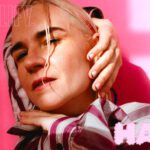
The Aussie producer talks queer acceptance, her new mix series for DJ-Kicks and the power of collaboration.
WORDS BY ALICE MOREY
ART DIRECTION BY ANISA CLEAVER
CREATIVE DIRECTION, PHOTOGRAPHY AND STYLING BY IMOGENE BARRON
PHOTOGRAPHY ASSISTANCE BY TOM LOMBARD
MAKEUP BY CHANTAL AMARI USING TOM FORD BEAUTY
HAIR BY JADAH DALE USING BLEACH LONDON
SPECIAL THANKS TO JARRAD CARLIN, ALICE AND GUY PELLY, LEANNE ELLIOT YOUNG, HELEN POVEY, FABIA JONES RUSSEL, VINNY SHEILS AND ELLIE SHAW
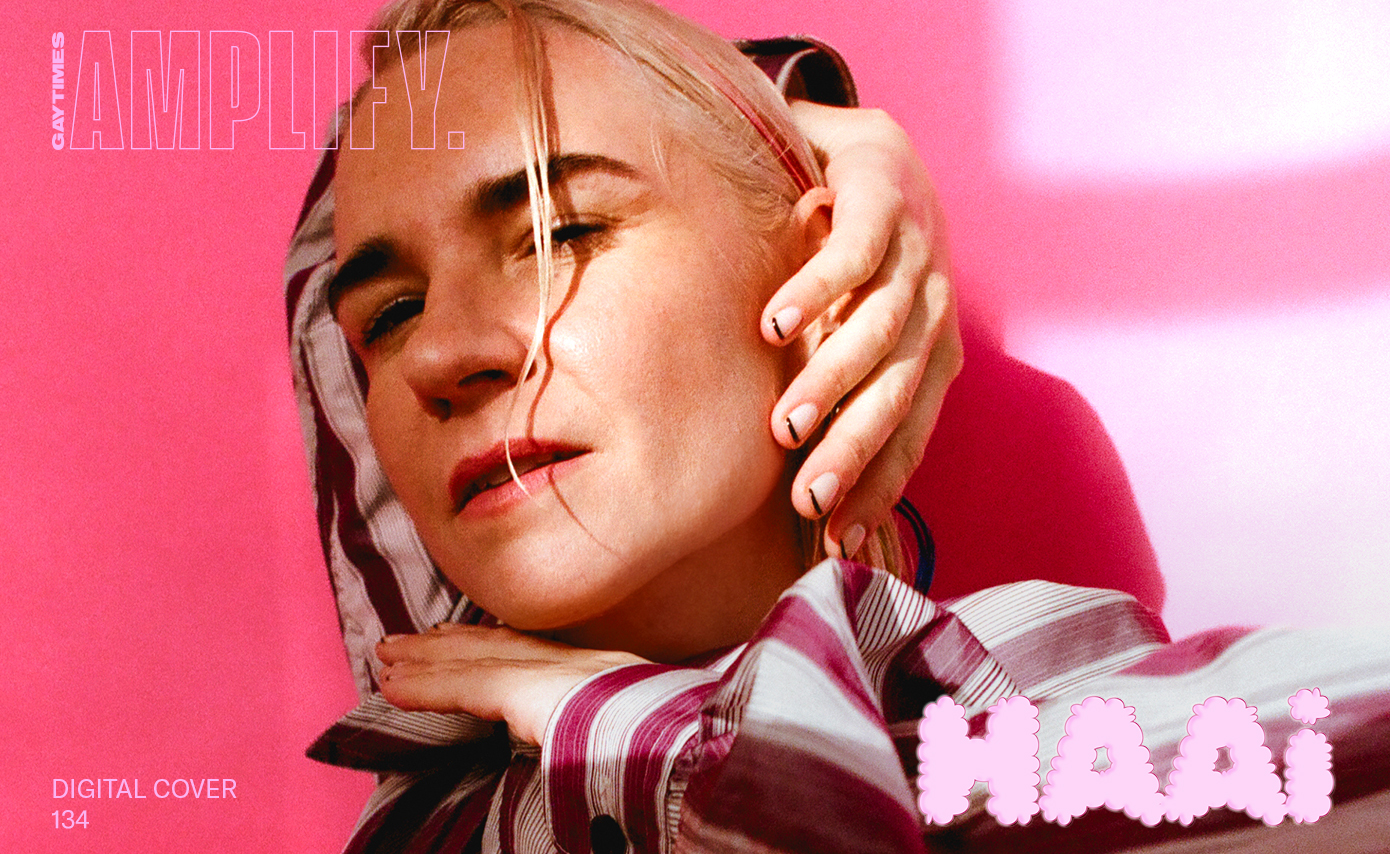
Three days before the launch of her new mix for DJ-Kicks, London-based artist HAAi comes into focus on Zoom. She’s wearing a fluffy cardigan over a buttoned-up white shirt. Her signature bitch-ass platinum bob is partially covered by a black baseball cap. “I apologise for being late, it’s been a ripper of a morning so far, everything’s going on,” she exclaims with a grin across her face.
It seems apt that the Aussie is a chameleon in her environment, averaging 100 shows a year. Nestled in the corner of her management’s office, HAAi – aka Teneil Throssell – has a lot of “sh*t going on”. After a busy summer closing out festivals – Body Movements to Glastonbury – and performing her notorious Hör set, Throsell dropped the official remix of Kylie Minogue’s queer anthem ‘Padam Padam’, a release that pulled in over 350,000 streams on Spotify. Perched, just behind Throsell, is a stack of Minogue’s merch: “Look at the ‘Padam’ merch I’ve got over here. The hoodies… A little bit of Kylie’s candle over there.”
Throssell’s rise to find her place, outside of being pigeonholed as the “non-male in this space”, has galvanised her commitment to platforming talent and her “confidence to talk about queerness” and to welcome fans into her universe. “Operating in a world that is not for you is about trying to find your place in what you’re doing,” she says. “Once I started doing more of that, I felt like I was welcomed with open arms and I had the confidence to speak up for our community and bring that into the parties that I was throwing”.
Looking ahead, the DJ has evolved her sound – influenced by the dancefloors of Berghain – taking on inspiration from techno, house, disco and African percussion to move crowds across the world. Quickly establishing herself as a notable name in the electronic music scene, Throssell released her debut album, Baby, We’re Ascending, in 2022.
Now, amidst the chaos of the DJ-Kicks launch and the creation of her second album, the producer sits down with GAY TIMES to discuss the new mix, her motivation for getting back on the dancefloor and the importance of finding her place in the LGBTQIA+ community.
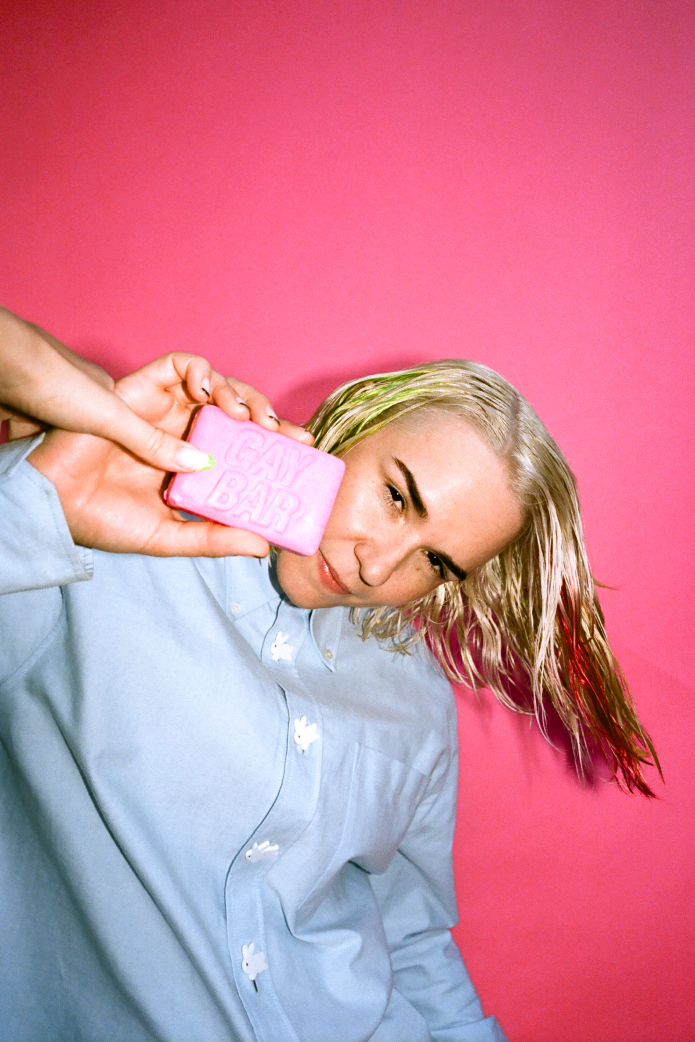
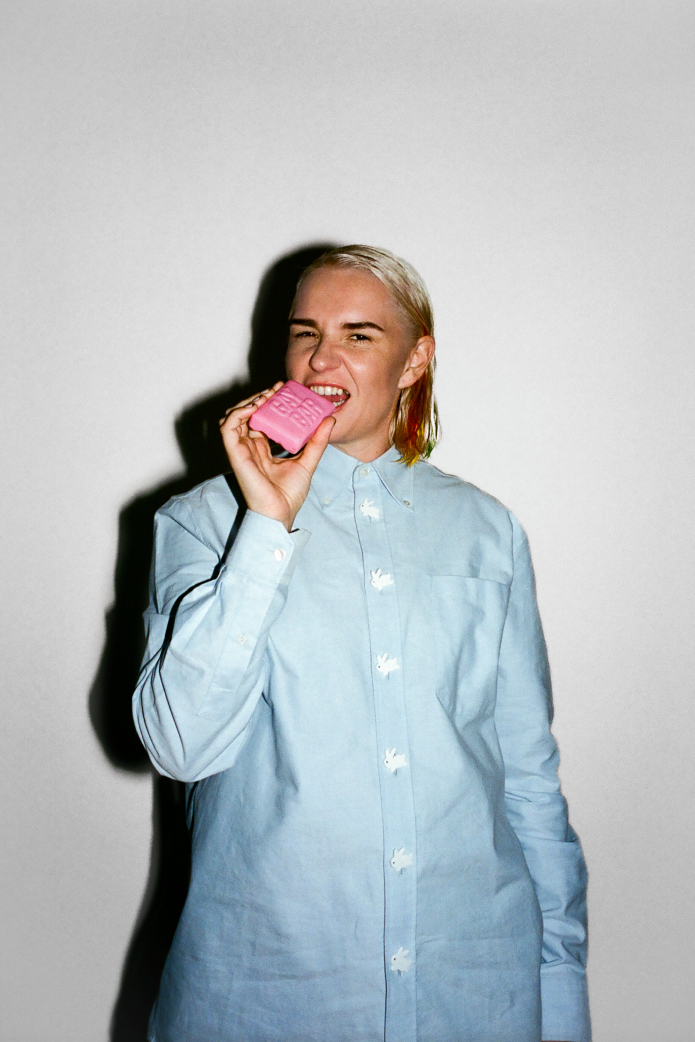
First of all, what’s the most outrageous live music experience that you’ve had as a performer?
There’s definitely been many different and outrageous things that have happened. I’ve been fortunate in the last couple of years, especially over festival season, to have played some massive stages and have some pretty spectacular moments in different countries. Playing Homobloc last year was a big highlight. I had Obi Franky come up and play with me for a track that we made for my album.
A couple of weeks ago I curated two big parties. One of them was in Brussels [NSB23 x Bozar – A night with HAAi, at Bozar, Saturday 14 October] and I took over this famous classical venue and turned it into a rave. It’s one of the most perfectly tuned rooms in the world, so it was crazy. That was a real career milestone. Then I did the same in London [An Evening with HAAi: HAAi + Special Guests, The Cause, 20 October] the following week, but we did it in a massive warehouse, which was really cool. It is these kinds of bigger curated things and you can bring my sense of community.
When it comes to LGBTQIA+ visibility, a lot of people are familiar with UK and US artists. As a queer artist, what’s it been like to break into the music scene?
My rise in music was a bit of an anomaly. I was picked up when I was casually playing records in a little bar that I worked in. I was given a residency at a club called Phonox [in Brixton in 2016] and the thing that was spoken about the most in the press was the fact that I was female, which was amazing and I was really happy to represent that and I felt very grateful to be a part of that kind of group. But, it took a long time for me to find my place existing, not just pigeonholed as being non-male in this space for me to go, ‘Okay, now it’s time.’
I had enough of a platform and enough self-confidence to be able to talk about queerness and introduce my crowd into how being queer is my life. Once your platform grows you have more of an opportunity to have a voice. I was really welcomed by my audience but I think because of that, it took a long time for me to play or even be offered to play queer parties and spaces. Operating in a world that is not for you is about trying to find your place in what you’re doing. Once I started doing more of that, I felt like I was welcomed with open arms and I had the confidence to speak up for our community and bring that into the parties that I was throwing.
How did you navigate your career, from residency to performing, in queer in spaces and building a queer-led team?
There were many things that happened in the chain. Do you know the film Sliding Doors? I feel like there were so many points in my career where I was the person where the train doors could have shut. I feel so grateful and understand how differently my life could be right now because of that, which is why I feel very duty-bound to use my position to help create opportunities for emerging artists – especially queer or artists from marginalised backgrounds. One of the big parts in that chain was a BBC 1 essential mix and I was offered one that coincidentally aired on the final night of my residency, which was all kind of witchy! I was only given two weeks to do it – usually, people get a few months. I ended up doing a really good job and won Radio 1’s Essential Mix of the Year in 2018, which was kind of crazy. That set my career on a different path.
My first welcoming from my community was when I was asked to play at a famous French queer party called Garçon Sauvage. It is from Lyon, but this one was in Montpellier. I had played with The Blessed Madonna a bunch of times before, but I had never been invited to be the main guest. As soon as I walked into this club, I was greeted in a way that I just felt I was fully at home. These people are like family and I had such a special time. I fully understand this other world that I haven’t really had much access to before. Once you start to do stuff like that and you get a bit more visibility within the queer scene, it snowballed into feeling I had a bit more access to something that I felt represented me.
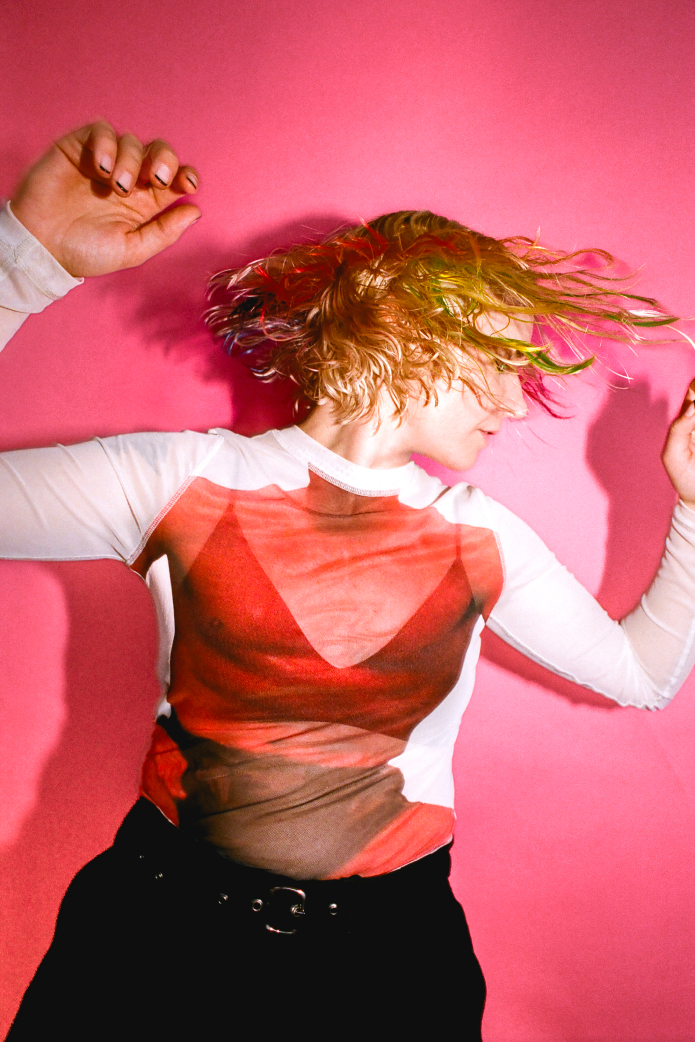
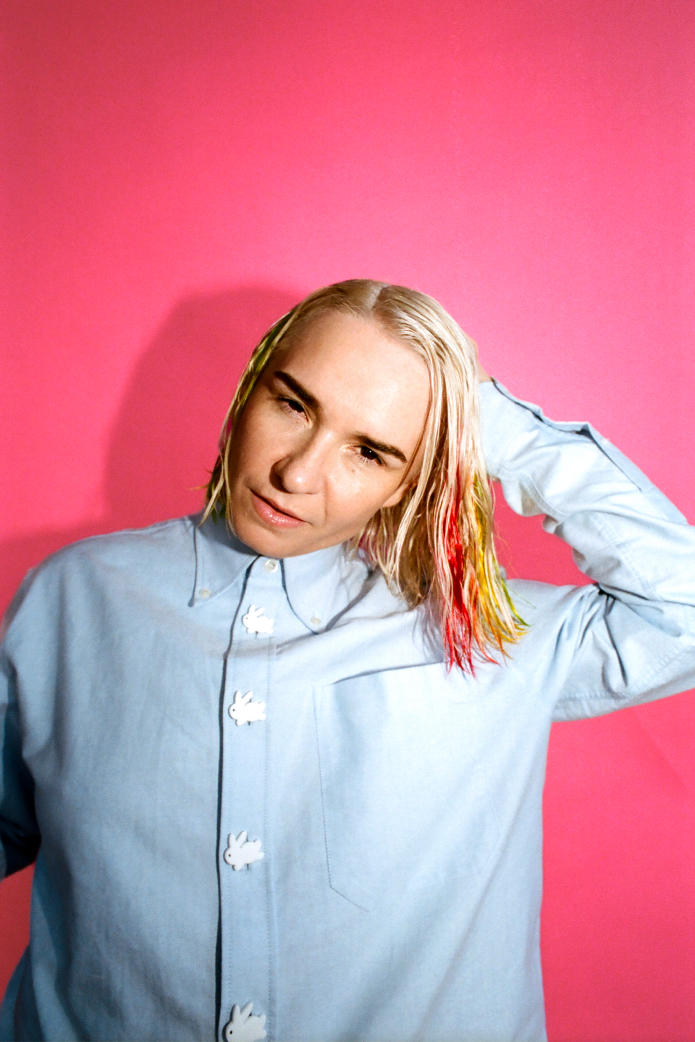
You’re operating across the DJ scene alongside some great artists that are enjoyed by the LGBTQIA+ community such as Romy and Avalon Emerson. What’s it like to be a part of this established wave of talent who are representing queer people?
Absolutely. It’s been really important for me to be vocal about my community. And in fact, the album that I released last year was very much about that. A lot of the people that I worked with were from my community as well. That was something really important. And I guess when you have a lived experience of being queer, you can invite people into a space without feeling so tokenistic. Every person who worked on the album who also happened to be queer was at the top of their game. Just to prove that it’s not difficult for us to bring people into what we’re doing and for them to be from our community as well. Historically, people who are straight and male who have done this before get offered these jobs a lot more. So, I think having a voice in this and for me to represent that as much as I can is super, super important.
You’ve worked with Romy, Fred Again, Kai Isaiah Jamal and Kylie Minogue, who is a queer icon. What is it like working with such an incredible range of artists?
Literally! It took me a really long time to be comfortable with collaboration. Even having an engineer in the studio with me, I was very protective of how I was making music. I feel like if you’re non-male, people are always looking for a reason to say that you’ve not made your music yourself. So I was like, ‘I’m doing every part of this’ so no one has any reason to challenge that. But it wasn’t until I was making the album where I realised there is so much power in bringing people into the world and giving people opportunities and to be platformed. For instance, Francine, who ended up being my engineer for that album, now tours with Romy. That’s the kind of cool stuff that can happen when you bring people into your world. The idea of collaboration means a lot more to me now than it did a few years ago.
Do you now have a dream collaboration in mind? Now you have eased your way into it?
There’s always pipe dreams. I’ve got a list. Someone really high on the list for me is Fever Ray. I’ve been a big fan of The Knife for a long time. I am obsessed with Beth Gibbons and Portishead, but there’s also a bunch of spoken word artists and rappers I would love to work with. I did a project with Dave a few years ago. I reworked a track [Future Utopia – Children of the Internet ft. Dave & Es Devlin [HAAi Rework] that he was on and that exposed me to working with spoken word.
We have to speak and manifest these things into existence. Your new mix for DJ-Kicks, was released on 10 November. What was the ambition behind the record?
It’s essentially a mixtape and I gave it a theme that I don’t think has been done before with DJ-Kicks. I wanted it to carry on the message that [my album] Baby, We’re Ascending had, but give it a bit of new life. I called it Always Ascending. I wanted to give this sense of community and collective euphoria, even for the people who were commissioned. I gave them the words ‘always ascending’ to interpret how you can. That was the backbone of the whole thing. There’s a lot sonically in the whole mix, but the feeling of euphoria was the most important.
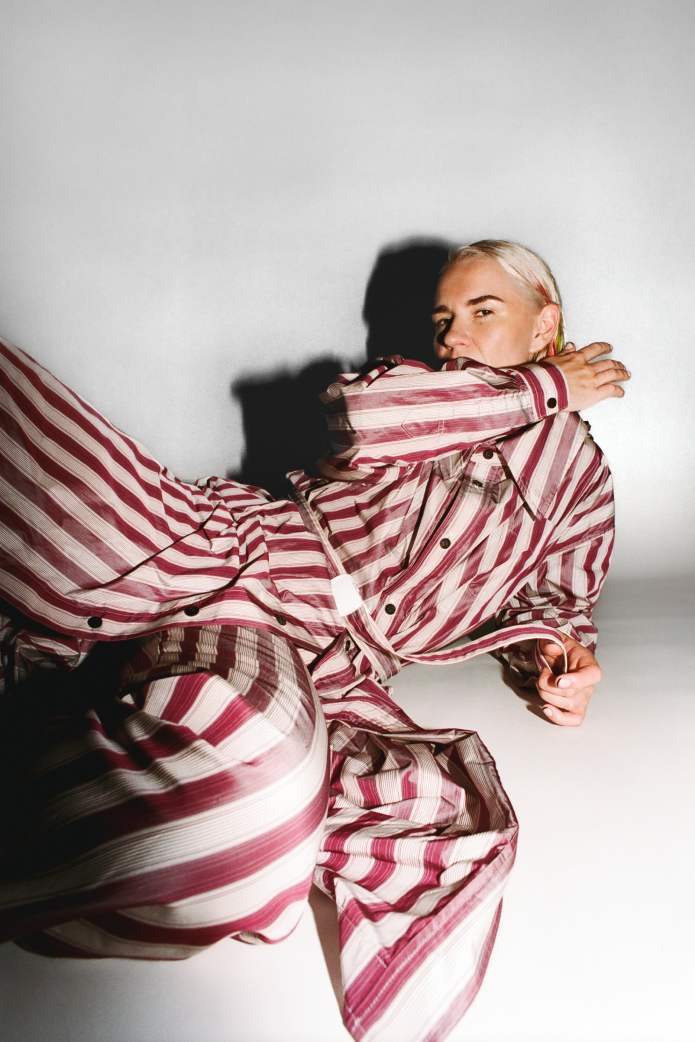
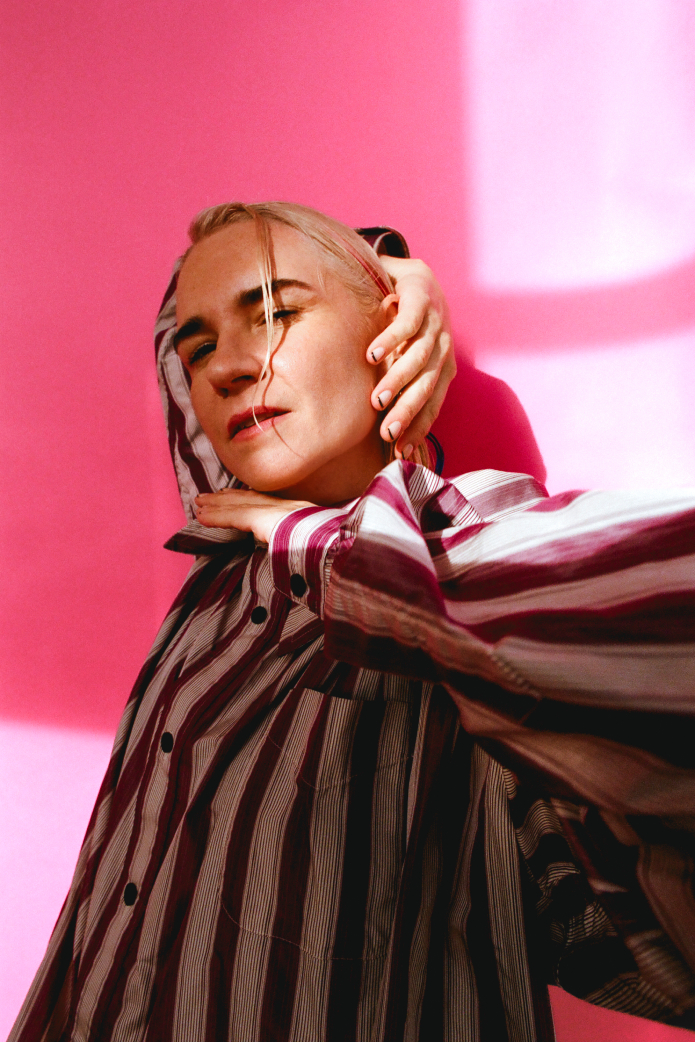
What do you want people to take away from it? Specifically queer people?
There are a few queer artists on the mix. People interpret music so personally and there’s a lot of stuff that’s quite lyrical on there, with a real message. For me, any kind of music that I make or release or mixes or anything that I do, you want to give people the feeling of togetherness. Especially right now, I think it’s always important, but it’s just sort of more important now than ever. Once it’s been pressed to vinyl and it’s in other people’s hands, it’s theirs to interpret. I hope everyone just loves it!
How has your sound evolved for this mix and were there any specific experiences that influenced what people are going to hear?
The tracks are definitely more dancefloor-focused. With my last album and what we were dealing with globally, it was more like music to be listened to rather than to dance to. This is definitely for the floor. Also, it’s a product of being back on tour as a DJ after the pandemic; spending a few nights a week playing clubs and festivals. Things for me are constantly evolving because I came into dance music so much later after being a guitar slinger. Every release that I make, things evolve in their own way because I’ve learned so much more within that time.
You already boast many career highs, but what’s your favourite music memory so far?
Wow, that’s a really good question. I love my job so much. I think the overall thing for me, what I get so much joy from is touring and getting to play so many shows. And there are a lot of memorable moments like the Brussels show, getting to do curated things, and special times like Glastonbury, where I played with I. JORDAN at the Temple Stage. You have this sort of gratitude because it easily could have never happened. I also got to play an impromptu set with SHERELLE and I. JORDAN on a stage that they curated, which was all queer. There have been many remarkable things that have happened. The whole thing is a wild ride.
DJ-Kicks: HAAi is out now.
The post The ascension of HAAi appeared first on GAY TIMES.

0 Comments